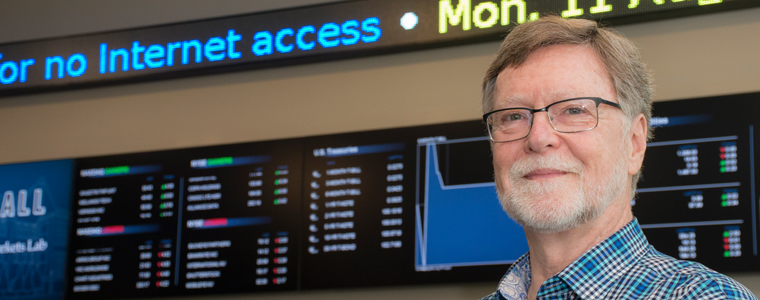The mission of the U.S. Securities and Exchange Commission is to “protect investors, maintain fair, orderly and efficient markets, and facilitate capital formation.”
That mission, says University of Florida finance Professor Mark Flannery, is at the heart of the American financial sector, and as the new director and chief economist for the SEC’s Division of Economic and Risk Analysis (DERA), he is eager to help the SEC meet that goal.
Although Flannery says he has much to learn about his new post, which he assumed in September, he does know that he would like to bolster economic research at DERA. The SEC’s substantial legal staff pores over documents of companies that want to sell securities in the public market to make sure the documents highlight the relevant risks.
“So the question is, what are the relevant risks?” Flannery says.
DERA’s role is to identify the economic factors in weighing risk, bringing economic as opposed to legal insight to rule writing and regulations. Flannery says the SEC has decided that it will adopt no rule without a complete economic cost benefit analysis.
“The economic analysis has to be done right in order for the rule to be considered, and that’s what interested me in the job,” Flannery says.
Flannery was quite happy in his role as the Bank of America eminent scholar at UF’s Warrington College of Business Administration, teaching graduate and MBA students and conducting his own research into government regulation of the financial sector. When he was approached about the job, however, the opportunity to use his research and classroom skills in the government sector intrigued him.
“One of the things I hope to do is find intuitive ways to explain to people why the markets behave the way they do,” Flannery says. “The SEC has a big public education program, and that is one of the things I hope to participate in.”
Flannery got a chance to put his gift for explaining financial research to work in a chat with an SEC commissioner during his selection process. The commissioner brought up a frequently misunderstood economic theorem.
“He said, ‘There’s this theorem, the Modigliani-Miller Theorem, that everybody talks about, and I don’t know anybody who understands it. What’s it about?’” Flannery recalled.
Experienced at teaching MBA students from diverse backgrounds, Flannery deftly explained the theorem, which led to Nobel Prizes for its two originators.
“He told me it was the first time the theorem made sense,” Flannery says.
The SEC was created during the Great Depression, in the wake of the stock market crash, when half of the securities offered in the post World War I era became worthless. The Division of Economic and Risk Analysis was created in 2009, and Flannery is the third chief economist to lead the division, which now numbers about 130 economists. He thinks published research is important in maintaining a good regulatory agency research department and hopes to foster more research.
“Having government economists encouraged to do their own research and to publish their research in refereed journals is a really important part of making the economic staff credible to the rest of the world,” Flannery says. “The things these economists learn in their agency work can inspire or motivate refereed research papers.”
Flannery brings to DERA a wealth of experience in academics and in other government advisory roles. He served as senior adviser to the Department of Treasury in the Office of Financial Research, and resident scholar for the Federal Reserve Bank of New York. He also was an advisory committee member on the Federal Reserve Bank of Atlanta’s Center for Financial Innovation and Financial Stability and served on the Federal Reserve’s Model Validation Council.
The one-year appointment is open to renewal but whenever he returns to the university, he expects his experience at the SEC to provide fuel for research and classroom discussions.
“This will familiarize me with institutions, data sources, behavior patterns that I’ve never been familiar with before, so I expect it’s going to generate a lot of research questions,” Flannery says. “My hope is that I’ll have a chance to start on some of them while I’m there. I’ll certainly store them up, so I think in that sense it’s going to make a big difference to my research program.
“It’s also going to make a big difference to what I can teach and the way I teach when I come back,” Flannery says. “I’m excited about the ability to come back and implement these things I learn.”
Flannery acknowledges public suspicion of the financial sector. He says a couple of people have half-jokingly asked him to be sure “somebody goes to jail.” He says education and prudent regulations can help allay suspicions and promote a more vigorous market.
“The public is very offended by what they view as some of the inequities,” Flannery says, “the stuff about how the banks got a big bailout, the managers got big pay, and we got unemployment.”
Flannery says the financial sector is more complicated than that, but the fact that notions of unfairness are so easily accepted points out the importance of one of the commission’s three goals: maintaining fair and orderly markets. If investors think the market is rigged, they will be less interested in putting their savings into the market, and that interferes with the ability of the economy to generate new capital.
“We’ve got all these economic issues. What are the most important ones and why? Explaining the why in an intuitive, non-technical way is a lot of what I do in the classroom and a lot of what I think I’m going to be doing up there,” Flannery says.
“This is an opportunity actually to make a difference based on the economics I’ve learned over the course of my career.”
Related Website:
This article was originally featured in the Fall 2014 issue of Explore Magazine.

